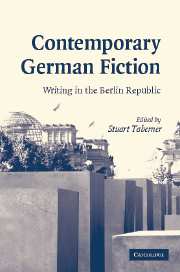Book contents
- Frontmatter
- Contents
- List of contributors
- Acknowledgments
- Note on texts and terminology
- 1 Introduction: literary fiction in the Berlin Republic
- 2 Literary debates and the literary market since unification
- 3 Berlin as the literary capital of German unification
- 4 ‘GDR literature’ in the Berlin Republic
- 5 ‘West German writing’ in the Berlin Republic
- 6 Literary reflections on '68
- 7 Pop literature in the Berlin Republic
- 8 Representations of the Nazi past I: perpetrators
- 9 Representations of the Nazi past II: German wartime suffering
- 10 German literature in the Berlin Republic – writing by women
- 11 Cultural memory and identity formation in the Berlin Republic
- 12 Turkish-German fiction since the mid 1990s
- 13 German-language writing from eastern and central Europe
- 14 Writing by Germany's Jewish minority
- Index
11 - Cultural memory and identity formation in the Berlin Republic
Published online by Cambridge University Press: 22 September 2009
- Frontmatter
- Contents
- List of contributors
- Acknowledgments
- Note on texts and terminology
- 1 Introduction: literary fiction in the Berlin Republic
- 2 Literary debates and the literary market since unification
- 3 Berlin as the literary capital of German unification
- 4 ‘GDR literature’ in the Berlin Republic
- 5 ‘West German writing’ in the Berlin Republic
- 6 Literary reflections on '68
- 7 Pop literature in the Berlin Republic
- 8 Representations of the Nazi past I: perpetrators
- 9 Representations of the Nazi past II: German wartime suffering
- 10 German literature in the Berlin Republic – writing by women
- 11 Cultural memory and identity formation in the Berlin Republic
- 12 Turkish-German fiction since the mid 1990s
- 13 German-language writing from eastern and central Europe
- 14 Writing by Germany's Jewish minority
- Index
Summary
Doesn't immigrating to Germany also mean immigrating to the recent German past?
Zafer ŞenocakThe contexts for this chapter are German memory debates since the 1990s and an academic preoccupation with collective memory as a normative discourse of shared values and cultural identity. Since unification, Germany has witnessed what Andreas Huyssen calls a ‘hypertrophe of memory’, attributable both to the need to negotiate a new sense of German identity and to anxieties about the accelerated obsolescence and space–time compression of postmodernity. Although German cultural memory is seen increasingly as a site of ‘memory contests’ rather than a consensual, culturally institutionalised heritage, and there has been a marked shift away from psychological towards performative paradigms of collective memory, it still revolves primarily around Holocaust commemoration and the Cold War. While collective memories of these events have undergone generational and political transformations, they remain grounded in a national narrative of recent German history. This perpetuates an ethno-culturalist form of German identity, quite at odds with Germany's ethnically diverse population. Nonetheless, many minority intellectuals are now intervening in debates about Holocaust and GDR memory. This chapter explores their work alongside a range of other literary texts that deterritorialise memory, loosening the links between memory and identity and rendering multiple identifications possible by means of ‘affect’.
The notion of ‘minor literature’, derived from Gilles Deleuze and Félix Guattari, is useful here, not only because some of the authors under discussion are of Turkish origin, but also because of the challenge their fictions pose to ethno-centric notions of community.
- Type
- Chapter
- Information
- Contemporary German FictionWriting in the Berlin Republic, pp. 177 - 195Publisher: Cambridge University PressPrint publication year: 2007
- 6
- Cited by



